The Cambridge History of China. Vol. 13: Republican China 1912-1949, Part 2
Подождите немного. Документ загружается.

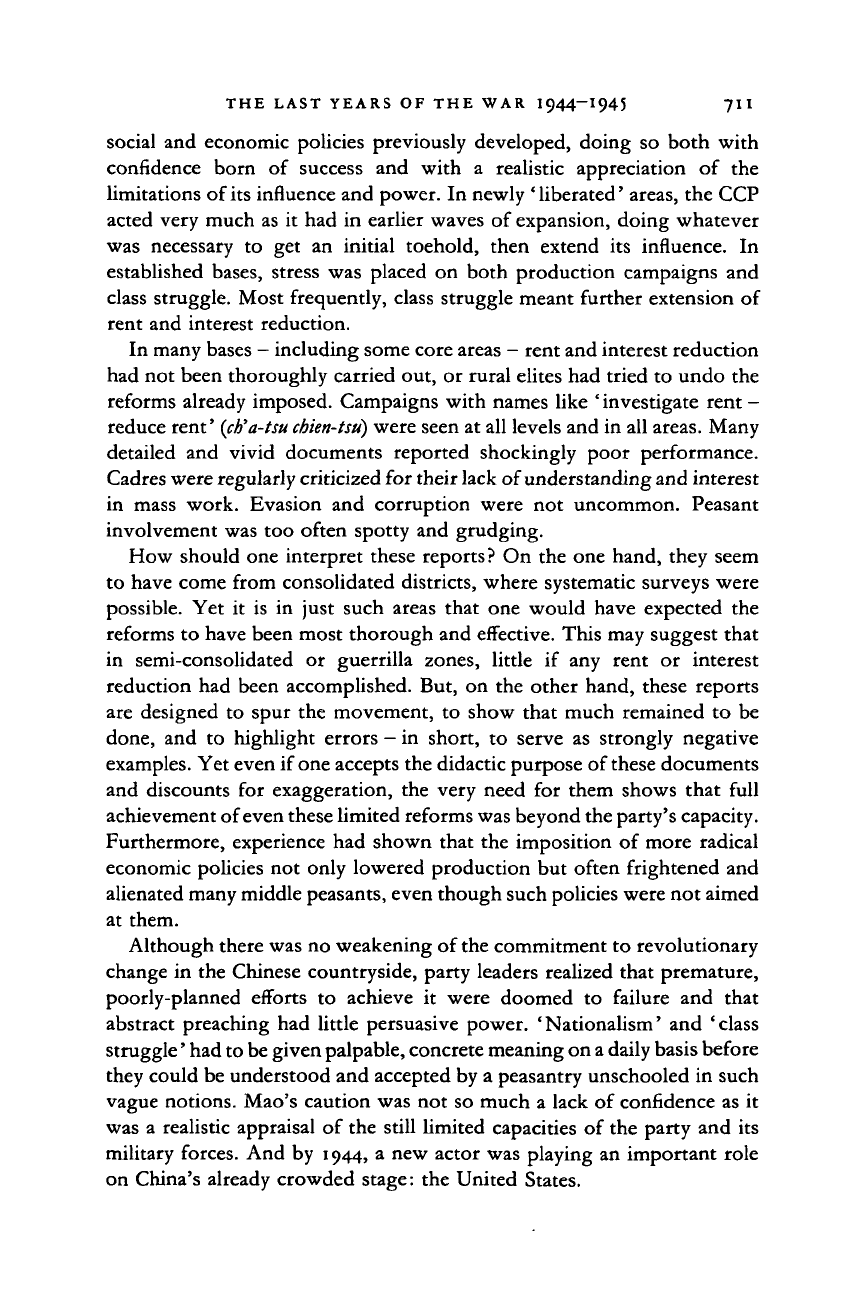
THE LAST YEARS OF THE WAR I944-I945 711
social and economic policies previously developed, doing so both with
confidence born of success and with a realistic appreciation of the
limitations of
its
influence and power. In newly ' liberated' areas, the CCP
acted very much as it had in earlier waves of expansion, doing whatever
was necessary to get an initial toehold, then extend its influence. In
established bases, stress was placed on both production campaigns and
class struggle. Most frequently, class struggle meant further extension of
rent and interest reduction.
In many bases - including some core areas - rent and interest reduction
had not been thoroughly carried out, or rural elites had tried to undo the
reforms already imposed. Campaigns with names like ' investigate rent -
reduce rent'
(ch'a-tsu cbien-tsu)
were seen at all levels and in all areas. Many
detailed and vivid documents reported shockingly poor performance.
Cadres were regularly criticized for their lack of understanding and interest
in mass work. Evasion and corruption were not uncommon. Peasant
involvement was too often spotty and grudging.
How should one interpret these reports? On the one hand, they seem
to have come from consolidated districts, where systematic surveys were
possible. Yet it is in just such areas that one would have expected the
reforms to have been most thorough and effective. This may suggest that
in semi-consolidated or guerrilla zones, little if any rent or interest
reduction had been accomplished. But, on the other hand, these reports
are designed to spur the movement, to show that much remained to be
done, and to highlight errors
—
in short, to serve as strongly negative
examples. Yet even if one accepts the didactic purpose of these documents
and discounts for exaggeration, the very need for them shows that full
achievement of even these limited reforms was beyond the party's capacity.
Furthermore, experience had shown that the imposition of more radical
economic policies not only lowered production but often frightened and
alienated many middle peasants, even though such policies were not aimed
at them.
Although there was no weakening of the commitment to revolutionary
change in the Chinese countryside, party leaders realized that premature,
poorly-planned efforts to achieve it were doomed to failure and that
abstract preaching had little persuasive power. 'Nationalism' and 'class
struggle' had to be given palpable, concrete meaning on
a
daily basis before
they could be understood and accepted by a peasantry unschooled in such
vague notions. Mao's caution was not so much a lack of confidence as it
was a realistic appraisal of the still limited capacities of the party and its
military forces. And by 1944, a new actor was playing an important role
on China's already crowded stage: the United States.
Cambridge Histories Online © Cambridge University Press, 2008
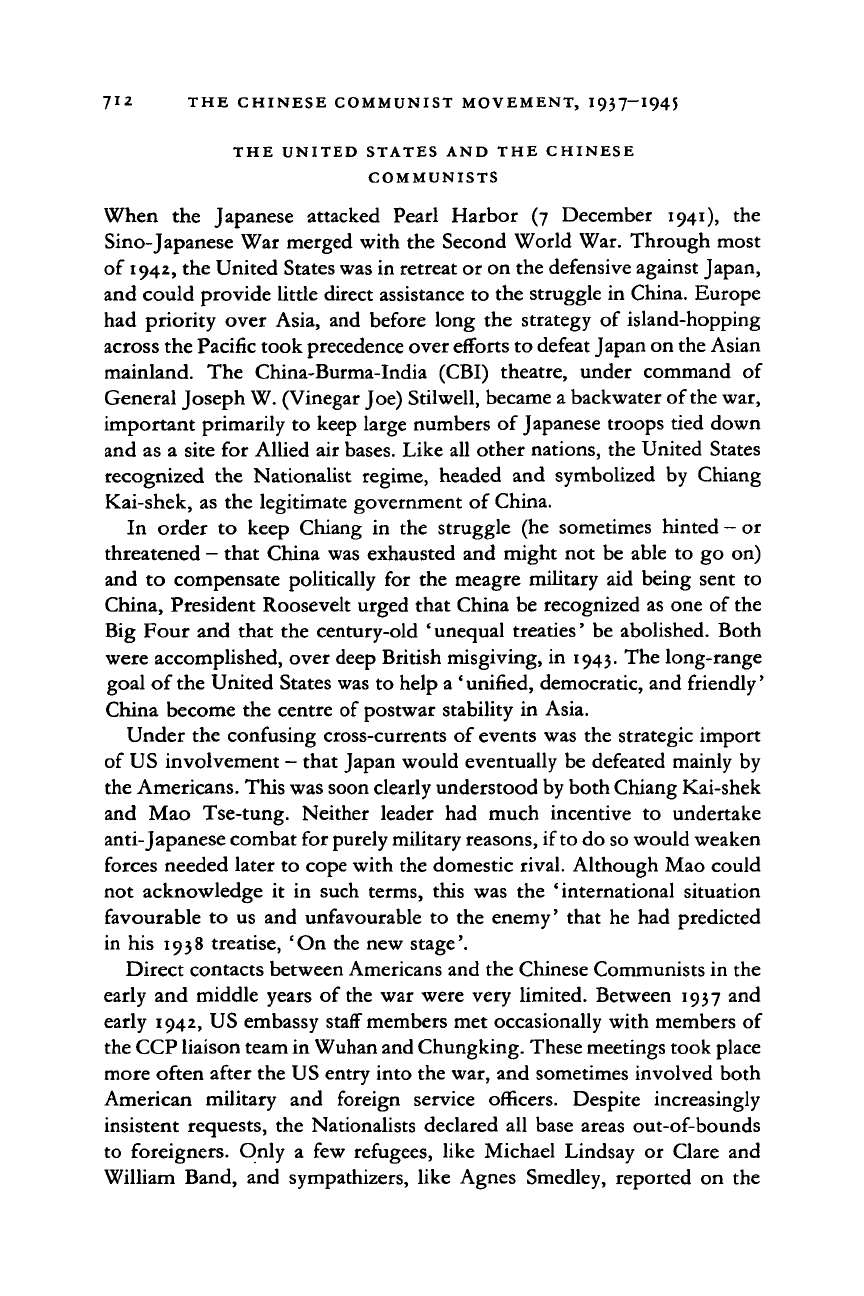
712 THE CHINESE COMMUNIST MOVEMENT, I937-I945
THE UNITED STATES AND THE CHINESE
COMMUNISTS
When the Japanese attacked Pearl Harbor (7 December 1941), the
Sino-Japanese War merged with the Second World War. Through most
of 1942, the United States was in retreat or on the defensive against Japan,
and could provide little direct assistance to the struggle in China. Europe
had priority over Asia, and before long the strategy of island-hopping
across the Pacific took precedence over efforts to defeat Japan on the Asian
mainland. The China-Burma-India (CBI) theatre, under command of
General Joseph W. (Vinegar Joe) Stilwell, became a backwater of the war,
important primarily to keep large numbers of Japanese troops tied down
and as a site for Allied air bases. Like all other nations, the United States
recognized the Nationalist regime, headed and symbolized by Chiang
Kai-shek, as the legitimate government of China.
In order to keep Chiang in the struggle (he sometimes hinted - or
threatened - that China was exhausted and might not be able to go on)
and to compensate politically for the meagre military aid being sent to
China, President Roosevelt urged that China be recognized as one of the
Big Four and that the century-old 'unequal treaties' be abolished. Both
were accomplished, over deep British misgiving, in 1943. The long-range
goal of the United States was to help a ' unified, democratic, and friendly'
China become the centre of postwar stability in Asia.
Under the confusing cross-currents of events was the strategic import
of US involvement
—
that Japan would eventually be defeated mainly by
the Americans. This was soon clearly understood by both Chiang Kai-shek
and Mao Tse-tung. Neither leader had much incentive to undertake
anti-Japanese combat for purely military reasons, if to do so would weaken
forces needed later to cope with the domestic rival. Although Mao could
not acknowledge it in such terms, this was the 'international situation
favourable to us and unfavourable to the enemy' that he had predicted
in his 1938 treatise, 'On the new stage'.
Direct contacts between Americans and the Chinese Communists in the
early and middle years of the war were very limited. Between 1937 and
early 1942, US embassy staff members met occasionally with members of
the CCP liaison team in Wuhan and Chungking. These meetings took place
more often after the US entry into the war, and sometimes involved both
American military and foreign service officers. Despite increasingly
insistent requests, the Nationalists declared all base areas out-of-bounds
to foreigners. Only a few refugees, like Michael Lindsay or Clare and
William Band, and sympathizers, like Agnes Smedley, reported on the
Cambridge Histories Online © Cambridge University Press, 2008
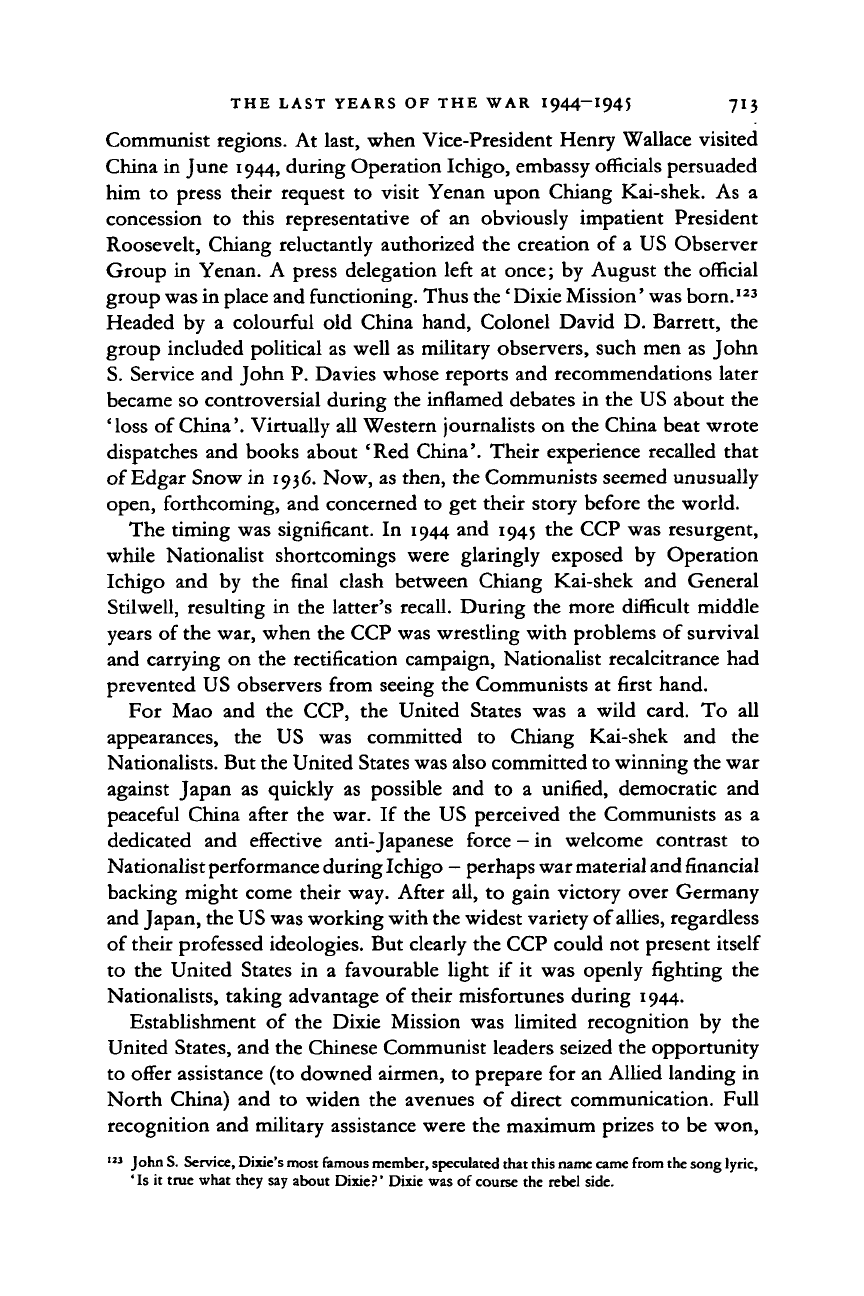
THE LAST YEARS OF THE WAR I944-I945 713
Communist regions. At last, when Vice-President Henry Wallace visited
China in June 1944, during Operation Ichigo, embassy officials persuaded
him to press their request to visit Yenan upon Chiang Kai-shek. As a
concession to this representative of an obviously impatient President
Roosevelt, Chiang reluctantly authorized the creation of a US Observer
Group in Yenan. A press delegation left at once; by August the official
group was in place and functioning. Thus the 'Dixie Mission' was born.
123
Headed by a colourful old China hand, Colonel David D. Barrett, the
group included political as well as military observers, such men as John
S. Service and John P. Davies whose reports and recommendations later
became so controversial during the inflamed debates in the US about the
'loss of China'. Virtually all Western journalists on the China beat wrote
dispatches and books about 'Red China'. Their experience recalled that
of Edgar Snow in 1936. Now, as then, the Communists seemed unusually
open, forthcoming, and concerned to get their story before the world.
The timing was significant. In 1944 and 1945 the CCP was resurgent,
while Nationalist shortcomings were glaringly exposed by Operation
Ichigo and by the final clash between Chiang Kai-shek and General
Stilwell, resulting in the latter's recall. During the more difficult middle
years of the war, when the CCP was wrestling with problems of survival
and carrying on the rectification campaign, Nationalist recalcitrance had
prevented US observers from seeing the Communists at first hand.
For Mao and the CCP, the United States was a wild card. To all
appearances, the US was committed to Chiang Kai-shek and the
Nationalists. But the United States was also committed to winning the war
against Japan as quickly as possible and to a unified, democratic and
peaceful China after the war. If the US perceived the Communists as a
dedicated and effective anti-Japanese force - in welcome contrast to
Nationalist performance during Ichigo - perhaps war material and financial
backing might come their way. After all, to gain victory over Germany
and Japan, the US was working with the widest variety of
allies,
regardless
of their professed ideologies. But clearly the CCP could not present itself
to the United States in a favourable light if it was openly fighting the
Nationalists, taking advantage of their misfortunes during 1944.
Establishment of the Dixie Mission was limited recognition by the
United States, and the Chinese Communist leaders seized the opportunity
to offer assistance (to downed airmen, to prepare for an Allied landing in
North China) and to widen the avenues of direct communication. Full
recognition and military assistance were the maximum prizes to be won,
111
John S. Service, Dixie's most famous member, speculated that this name came from the song lyric,
'Is it true what they say about Dixie?" Dixie was of course the rebel side.
Cambridge Histories Online © Cambridge University Press, 2008
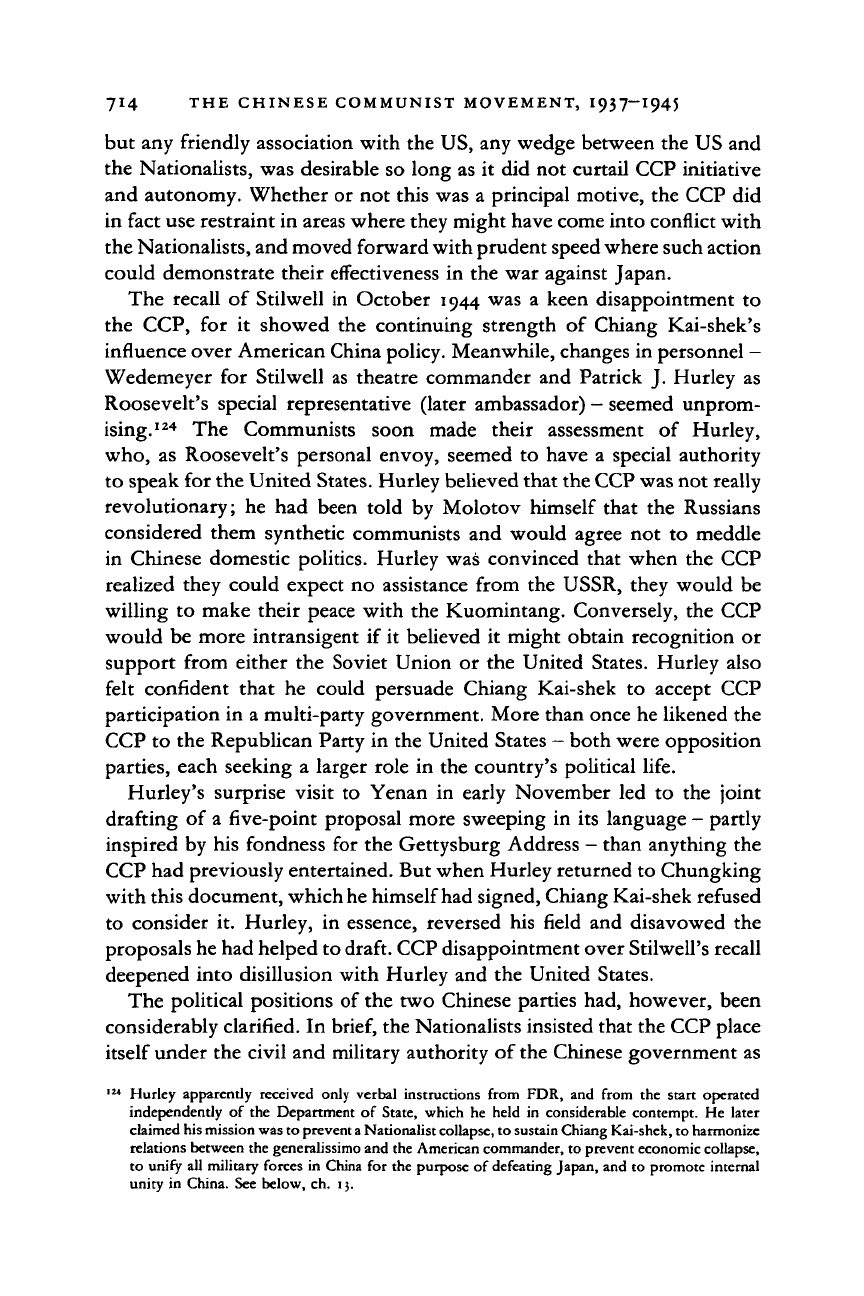
714 THE CHINESE COMMUNIST MOVEMENT, I937-I945
but any friendly association with the US, any wedge between the US and
the Nationalists, was desirable so long as
it
did not curtail CCP initiative
and autonomy. Whether or not this was a principal motive, the CCP did
in fact use restraint in areas where they might have come into conflict with
the Nationalists, and moved forward with prudent speed where such action
could demonstrate their effectiveness in the war against Japan.
The recall
of
Stilwell in October 1944 was
a
keen disappointment
to
the CCP,
for it
showed the continuing strength
of
Chiang Kai-shek's
influence over American China policy. Meanwhile, changes in personnel
-
Wedemeyer
for
Stilwell as theatre commander and Patrick
J.
Hurley
as
Roosevelt's special representative (later ambassador)
—
seemed unprom-
ising.
124
The
Communists soon made their assessment
of
Hurley,
who,
as
Roosevelt's personal envoy, seemed
to
have
a
special authority
to speak for the United States. Hurley believed that the CCP was not really
revolutionary;
he
had been told by Molotov himself that the Russians
considered them synthetic communists and would agree not
to
meddle
in Chinese domestic politics. Hurley was convinced that when the CCP
realized they could expect no assistance from the USSR, they would be
willing to make their peace with the Kuomintang. Conversely, the CCP
would be more intransigent
if
it believed
it
might obtain recognition or
support from either the Soviet Union
or
the United States. Hurley also
felt confident that
he
could persuade Chiang Kai-shek
to
accept CCP
participation in a multi-party government. More than once he likened the
CCP to the Republican Party in the United States
-
both were opposition
parties, each seeking
a
larger role in the country's political life.
Hurley's surprise visit
to
Yenan
in
early November led
to
the joint
drafting of a five-point proposal more sweeping in its language
—
partly
inspired by his fondness for the Gettysburg Address
-
than anything the
CCP had previously entertained. But when Hurley returned to Chungking
with this document, which
he
himself had signed, Chiang Kai-shek refused
to consider it. Hurley, in essence, reversed his field and disavowed the
proposals he had helped to draft. CCP disappointment over Stilwell's recall
deepened into disillusion with Hurley and the United States.
The political positions of the two Chinese parties had, however, been
considerably clarified. In
brief,
the Nationalists insisted that the CCP place
itself under the civil and military authority of the Chinese government as
124
Hurley apparently received only verbal instructions from FDR, and from the start operated
independently
of
the Department
of
State, which he held
in
considerable contempt. He later
claimed his mission was to prevent
a
Nationalist collapse, to sustain Chiang Kai-shek, to harmonize
relations between the generalissimo and the American commander, to prevent economic collapse,
to unify all military forces in China for the purpose of defeating Japan, and to promote internal
unity in China. See below, ch. 13.
Cambridge Histories Online © Cambridge University Press, 2008
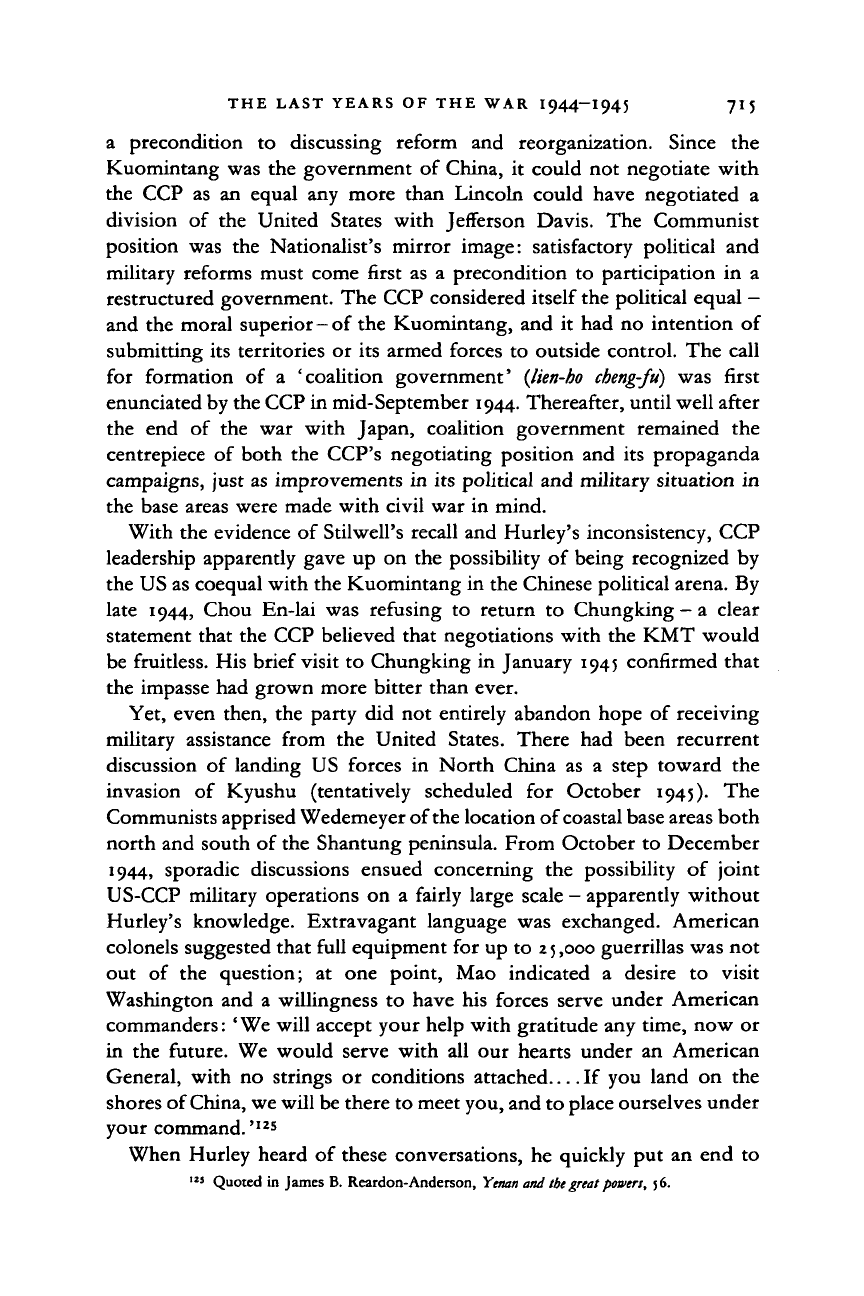
THE LAST YEARS OF THE WAR I944-I945 715
a precondition to discussing reform and reorganization. Since the
Kuomintang was the government of China, it could not negotiate with
the CCP as an equal any more than Lincoln could have negotiated a
division of the United States with Jefferson Davis. The Communist
position was the Nationalist's mirror image: satisfactory political and
military reforms must come first as a precondition to participation in a
restructured government. The CCP considered itself the political equal -
and the moral superior-of the Kuomintang, and it had no intention of
submitting its territories or its armed forces to outside control. The call
for formation of a 'coalition government'
(Jien-ho cbeng-fti)
was first
enunciated by the CCP in mid-September 1944. Thereafter, until well after
the end of the war with Japan, coalition government remained the
centrepiece of both the CCP's negotiating position and its propaganda
campaigns, just as improvements in its political and military situation in
the base areas were made with civil war in mind.
With the evidence of Stilwell's recall and Hurley's inconsistency, CCP
leadership apparently gave up on the possibility of being recognized by
the US as coequal with the Kuomintang in the Chinese political arena. By
late 1944, Chou En-lai was refusing to return to Chungking - a clear
statement that the CCP believed that negotiations with the KMT would
be fruitless. His brief visit to Chungking in January 1945 confirmed that
the impasse had grown more bitter than ever.
Yet, even then, the party did not entirely abandon hope of receiving
military assistance from the United States. There had been recurrent
discussion of landing US forces in North China as a step toward the
invasion of Kyushu (tentatively scheduled for October 1945). The
Communists apprised Wedemeyer of the location of coastal base areas both
north and south of the Shantung peninsula. From October to December
1944,
sporadic discussions ensued concerning the possibility of joint
US-CCP military operations on a fairly large scale
—
apparently without
Hurley's knowledge. Extravagant language was exchanged. American
colonels suggested that full equipment for up to 25,000 guerrillas was not
out of the question; at one point, Mao indicated a desire to visit
Washington and a willingness to have his forces serve under American
commanders:
' We
will accept your help with gratitude any time, now or
in the future. We would serve with all our hearts under an American
General, with no strings or conditions attached.... If you land on the
shores of China, we will be there to meet you, and to place ourselves under
your command.'
IZS
When Hurley heard of these conversations, he quickly put an end to
I2S
Quoted in James B. Reardon-Anderson, Yenan and
the
great power:, 56.
Cambridge Histories Online © Cambridge University Press, 2008
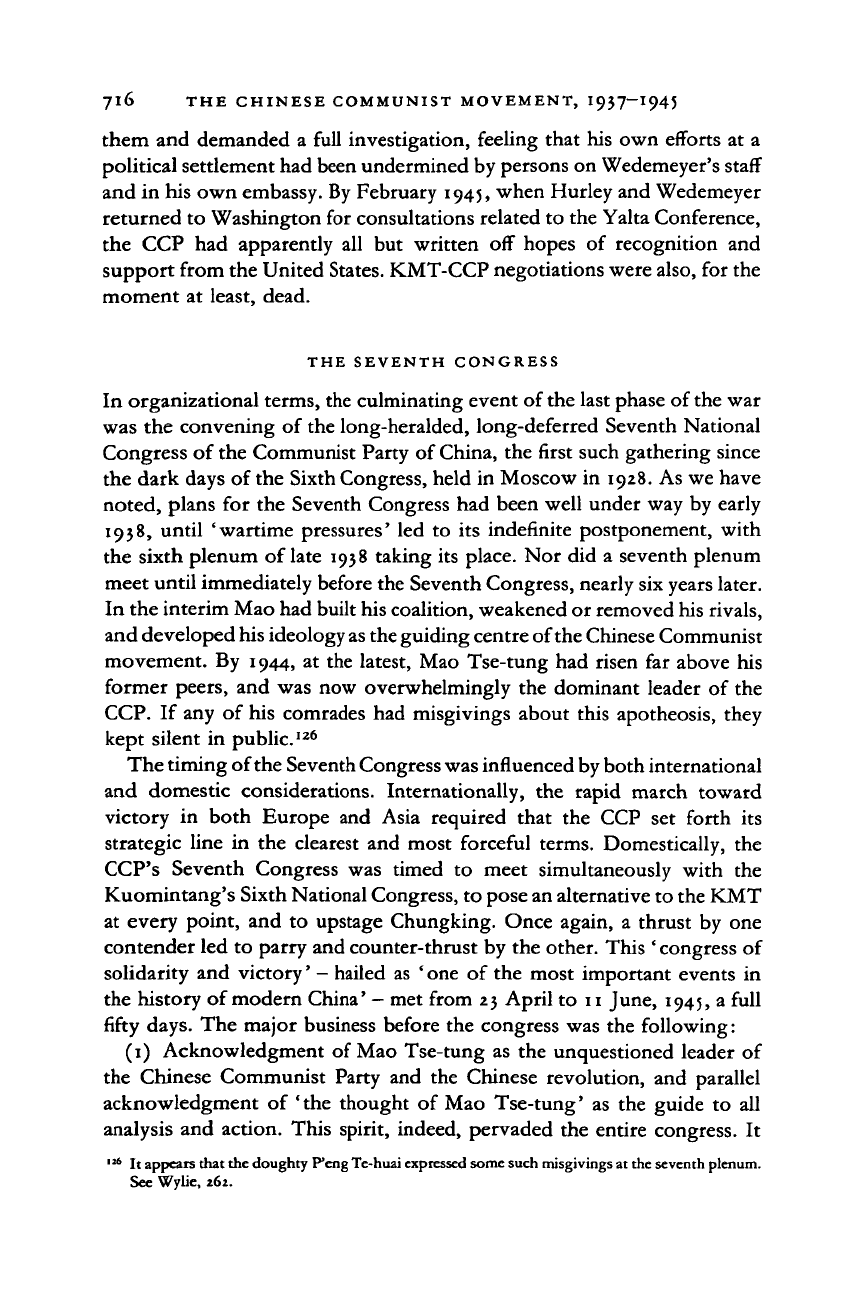
THE CHINESE COMMUNIST MOVEMENT, I937-I945
them
and
demanded
a
full investigation, feeling that
his own
efforts
at a
political settlement had been undermined by persons on Wedemeyer's staff
and
in
his own embassy. By February 1945, when Hurley and Wedemeyer
returned
to
Washington
for
consultations related
to
the Yalta Conference,
the
CCP had
apparently
all but
written
off
hopes
of
recognition
and
support from the United States. KMT-CCP negotiations were also,
for
the
moment
at
least, dead.
THE SEVENTH CONGRESS
In organizational terms, the culminating event
of
the last phase
of
the war
was
the
convening
of
the long-heralded, long-deferred Seventh National
Congress
of
the Communist Party
of
China,
the
first such gathering since
the dark days
of
the Sixth Congress, held
in
Moscow
in
1928. As we have
noted, plans
for the
Seventh Congress
had
been well under way
by
early
1938,
until 'wartime pressures'
led to its
indefinite postponement, with
the sixth plenum
of
late 1938 taking
its
place.
Nor did a
seventh plenum
meet until immediately before the Seventh Congress, nearly six years later.
In the interim Mao had built his coalition, weakened
or
removed his rivals,
and developed his ideology
as
the guiding centre of the Chinese Communist
movement.
By
1944,
at the
latest, Mao Tse-tung
had
risen
far
above
his
former peers,
and was now
overwhelmingly
the
dominant leader
of
the
CCP.
If
any
of
his comrades
had
misgivings about this apotheosis, they
kept silent
in
public.
126
The timing of the Seventh Congress
was
influenced by both international
and domestic considerations. Internationally,
the
rapid march toward
victory
in
both Europe
and
Asia required that
the CCP set
forth
its
strategic line
in the
clearest
and
most forceful terms. Domestically,
the
CCP's Seventh Congress
was
timed
to
meet simultaneously with
the
Kuomintang's Sixth National Congress, to pose an alternative to the KMT
at every point,
and to
upstage Chungking. Once again,
a
thrust
by one
contender led
to
parry and counter-thrust
by
the other. This
'
congress
of
solidarity
and
victory'
-
hailed
as '
one
of
the most important events
in
the history
of
modern China'
-
met from 23 April
to
11 June, 1945,
a
full
fifty
days.
The
major business before
the
congress was
the
following:
(1) Acknowledgment
of
Mao Tse-tung
as the
unquestioned leader
of
the Chinese Communist Party
and the
Chinese revolution,
and
parallel
acknowledgment
of
' the thought
of
Mao Tse-tung'
as the
guide
to all
analysis
and
action. This spirit, indeed, pervaded
the
entire congress.
It
126
It appears that the doughty P"eng Te-huai expressed some such misgivings at the seventh plenum.
See Wylie, 262.
Cambridge Histories Online © Cambridge University Press, 2008
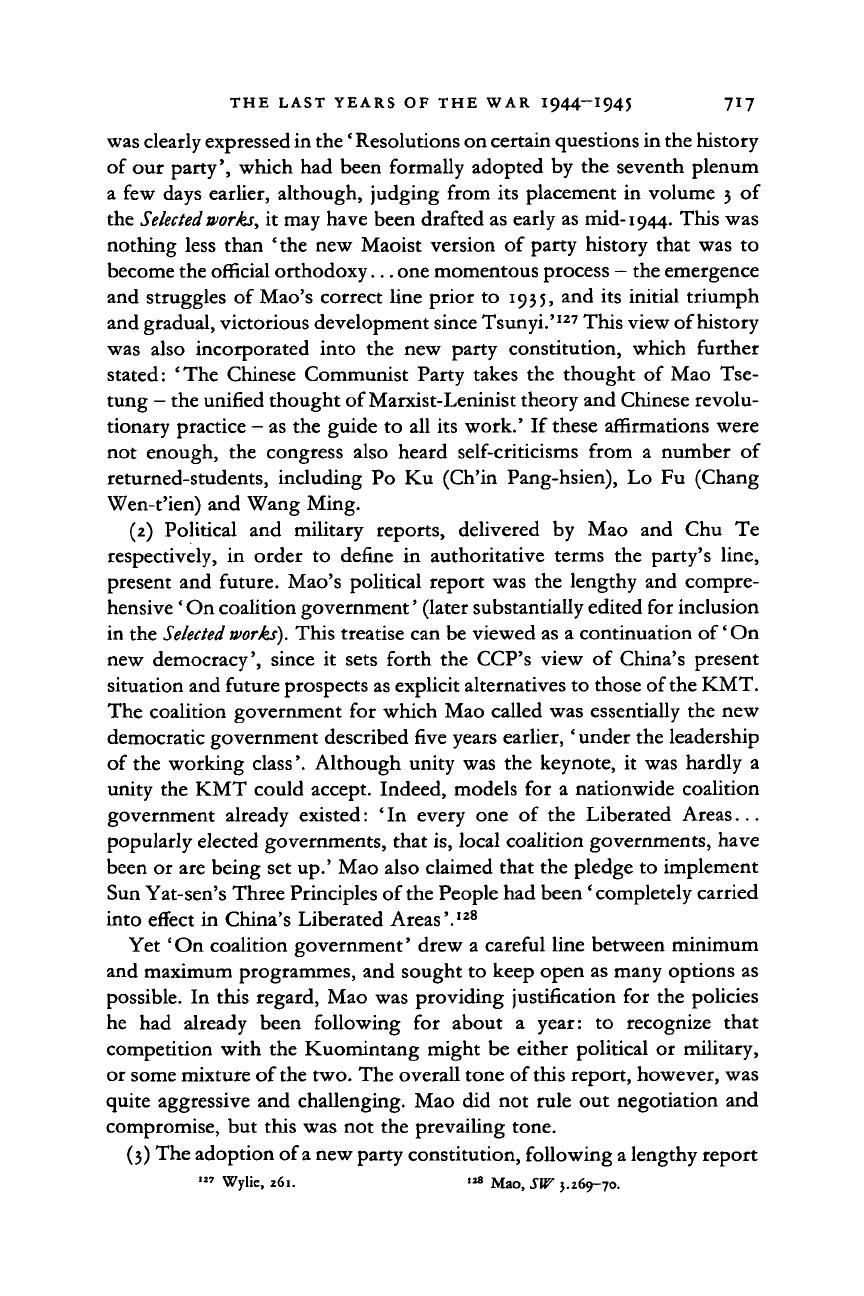
THE LAST YEARS OF THE WAR 1944-1945 717
was clearly expressed in the' Resolutions on certain questions in the history
of our party', which had been formally adopted by the seventh plenum
a few days earlier, although, judging from its placement in volume 3 of
the
Selected
works,
it may have been drafted as early as mid-1944. This was
nothing less than '
the
new Maoist version of party history that was to
become the official orthodoxy... one momentous process - the emergence
and struggles of Mao's correct line prior to 1935, and its initial triumph
and gradual, victorious development since Tsunyi.'
127
This view of history
was also incorporated into the new party constitution, which further
stated: ' The Chinese Communist Party takes the thought of Mao Tse-
tung - the unified thought of Marxist-Leninist theory and Chinese revolu-
tionary practice - as the guide to all its work.' If these affirmations were
not enough, the congress also heard self-criticisms from a number of
returned-students, including Po Ku (Ch'in Pang-hsien), Lo Fu (Chang
Wen-t'ien) and Wang Ming.
(2) Political and military reports, delivered by Mao and Chu Te
respectively, in order to define in authoritative terms the party's line,
present and future. Mao's political report was the lengthy and compre-
hensive ' On coalition government' (later substantially edited for inclusion
in the
Selected
works).
This treatise can be viewed as a continuation of' On
new democracy', since it sets forth the CCP's view of China's present
situation and future prospects as explicit alternatives to those of the KMT.
The coalition government for which Mao called was essentially the new
democratic government described five years earlier,' under the leadership
of the working class'. Although unity was the keynote, it was hardly a
unity the KMT could accept. Indeed, models for a nationwide coalition
government already existed: ' In every one of the Liberated Areas...
popularly elected governments, that is, local coalition governments, have
been or are being set up.' Mao also claimed that the pledge to implement
Sun Yat-sen's Three Principles of the People had been 'completely carried
into effect in China's Liberated Areas'.
128
Yet 'On coalition government' drew a careful line between minimum
and maximum programmes, and sought to keep open as many options as
possible. In this regard, Mao was providing justification for the policies
he had already been following for about a year: to recognize that
competition with the Kuomintang might be either political or military,
or some mixture of the two. The overall tone of this report, however, was
quite aggressive and challenging. Mao did not rule out negotiation and
compromise, but this was not the prevailing tone.
(3) The adoption of a new party constitution, following a lengthy report
'" Wylie, 261. '*« Mao, SW 5.269-70.
Cambridge Histories Online © Cambridge University Press, 2008
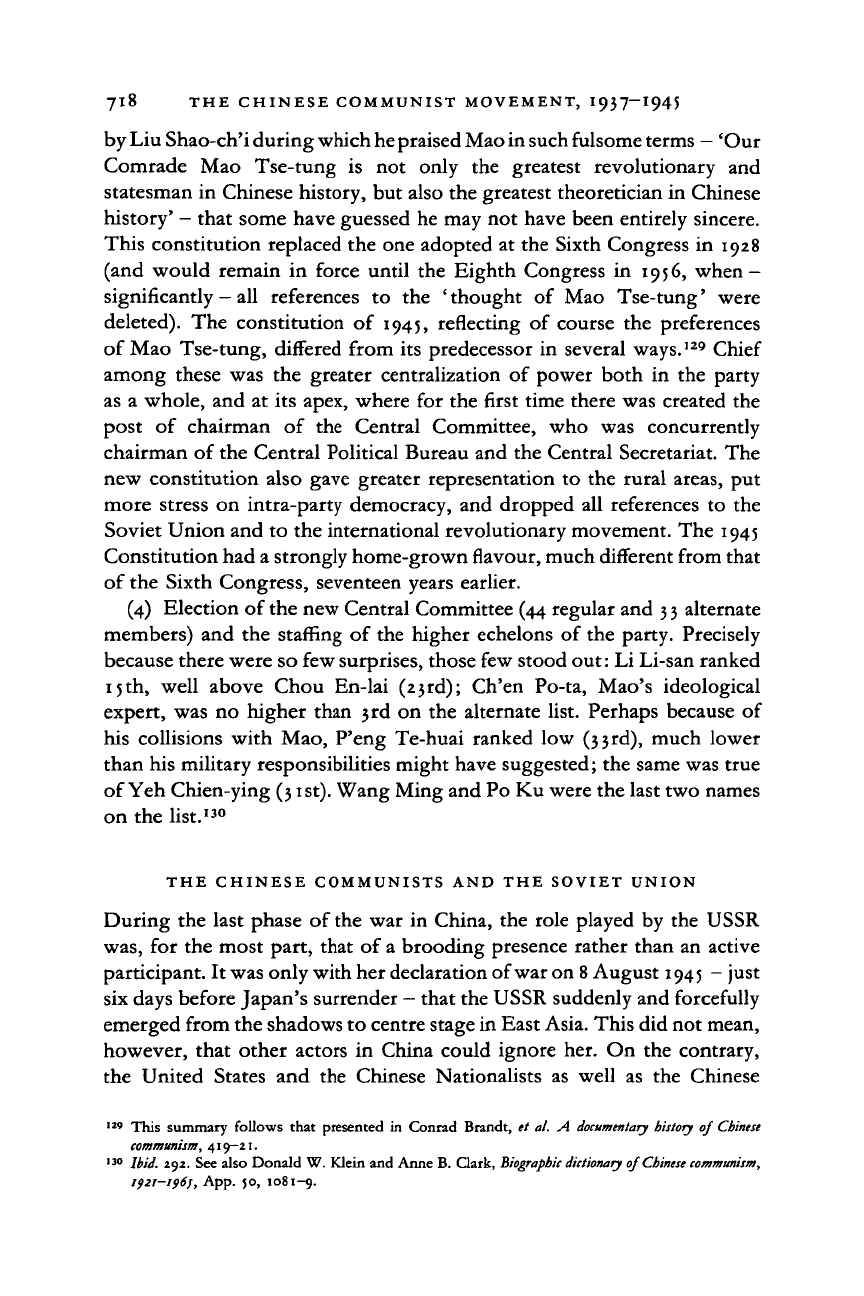
718 THE CHINESE COMMUNIST MOVEMENT, I937-I945
by Liu Shao-ch'i during which
he
praised
Mao
in such fulsome terms
—
'Our
Comrade Mao Tse-tung
is not
only
the
greatest revolutionary
and
statesman in Chinese history, but also the greatest theoretician in Chinese
history'
-
that some have guessed he may not have been entirely sincere.
This constitution replaced the one adopted at the Sixth Congress in 1928
(and would remain
in
force until the Eighth Congress
in
1956, when
-
significantly
-
all references
to the
' thought
of
Mao Tse-tung' were
deleted). The constitution
of
1945, reflecting
of
course the preferences
of Mao Tse-tung, differed from its predecessor in several ways.
129
Chief
among these was the greater centralization
of
power both
in
the party
as
a
whole, and at its apex, where for the first time there was created the
post
of
chairman
of the
Central Committee, who
was
concurrently
chairman of the Central Political Bureau and the Central Secretariat. The
new constitution also gave greater representation to the rural areas, put
more stress on intra-party democracy, and dropped all references
to
the
Soviet Union and to the international revolutionary movement. The 1945
Constitution had a strongly home-grown flavour, much different from that
of the Sixth Congress, seventeen years earlier.
(4) Election of the new Central Committee (44 regular and
3 3
alternate
members) and the staffing
of
the higher echelons of the party. Precisely
because there were so few surprises, those few stood out: Li Li-san ranked
15 th,
well above Chou En-lai (23
rd);
Ch'en Po-ta, Mao's ideological
expert, was no higher than 3rd on the alternate list. Perhaps because of
his collisions with Mao, P'eng Te-huai ranked low (33rd), much lower
than his military responsibilities might have suggested; the same was true
of Yeh Chien-ying (31st). Wang Ming and Po Ku were the last two names
on the list.
130
THE CHINESE COMMUNISTS AND THE SOVIET UNION
During the last phase of the war in China, the role played by the USSR
was,
for the most part, that of a brooding presence rather than an active
participant. It was only with her declaration of war on
8
August 1945
-
just
six days before Japan's surrender
-
that the USSR suddenly and forcefully
emerged from the shadows to centre stage in East Asia. This did not mean,
however, that other actors
in
China could ignore her. On the contrary,
the United States and the Chinese Nationalists
as
well
as
the Chinese
129
This summary follows that presented
in
Conrad Brandt,
et al.
A
documentary history
of
Chinese
communism,
419—21.
130
Ibid.
292. See also Donald W. Klein and Anne B. Clark,
Biographic dictionary
of
Chinese
communism,
1921-196},
App. 50, 1081-9.
Cambridge Histories Online © Cambridge University Press, 2008
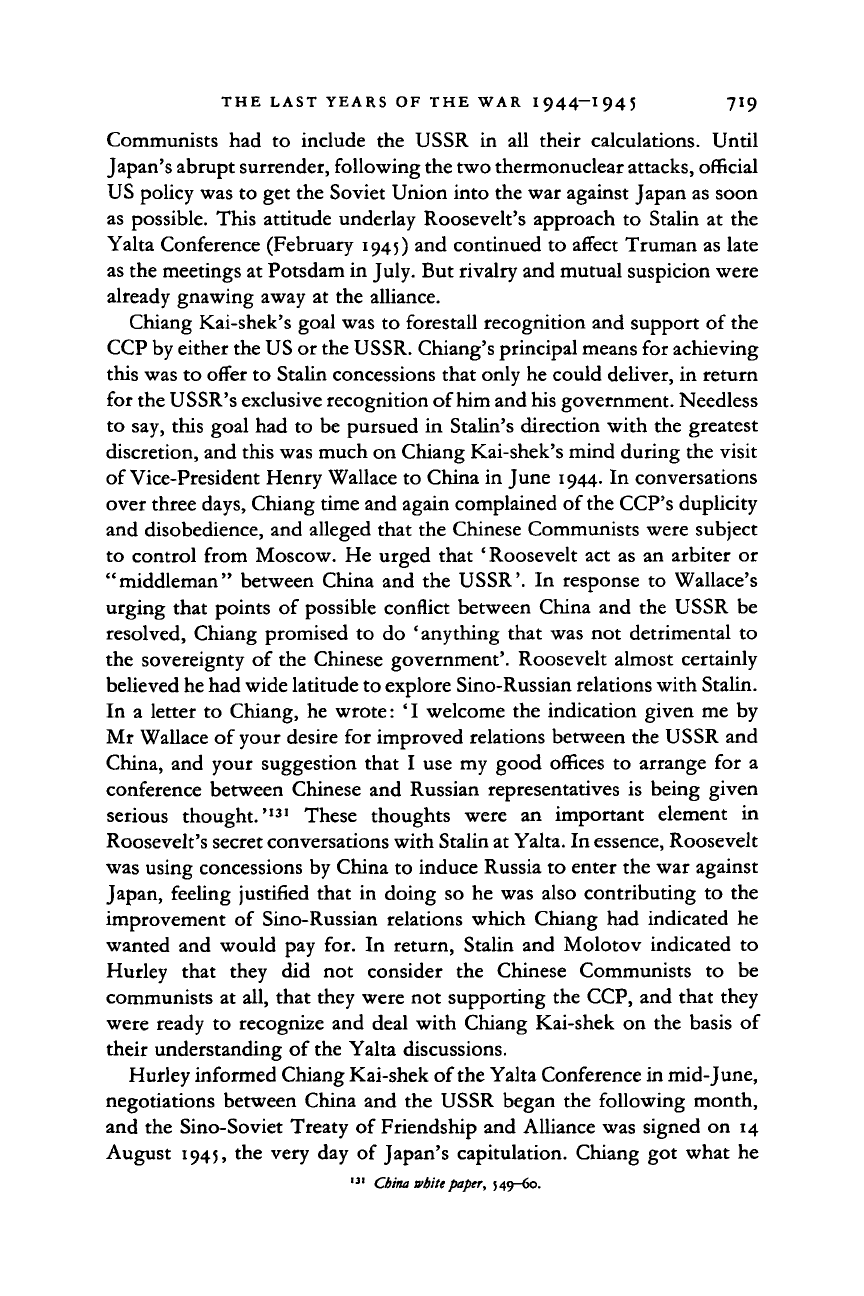
THE LAST YEARS OF THE WAR I944-I945 719
Communists
had to
include
the
USSR
in all
their calculations. Until
Japan's abrupt surrender, following the two thermonuclear
attacks,
official
US policy was to get the Soviet Union into the war against Japan as soon
as possible. This attitude underlay Roosevelt's approach
to
Stalin
at
the
Yalta Conference (February 1945) and continued to affect Truman as late
as the meetings at Potsdam in July. But rivalry and mutual suspicion were
already gnawing away
at
the alliance.
Chiang Kai-shek's goal was to forestall recognition and support of the
CCP by either the US or the USSR. Chiang's principal means for achieving
this was to offer to Stalin concessions that only he could deliver, in return
for the USSR's exclusive recognition of him and his government. Needless
to say, this goal had to be pursued in Stalin's direction with the greatest
discretion, and this was much on Chiang Kai-shek's mind during the visit
of Vice-President Henry Wallace to China in June 1944. In conversations
over three days, Chiang time and again complained of
the
CCP's duplicity
and disobedience, and alleged that the Chinese Communists were subject
to control from Moscow. He urged that 'Roosevelt act as an arbiter
or
"middleman" between China and the USSR'.
In
response
to
Wallace's
urging that points
of
possible conflict between China and the USSR
be
resolved, Chiang promised
to do
'anything that was not detrimental
to
the sovereignty
of
the Chinese government'. Roosevelt almost certainly
believed he had wide latitude to explore Sino-Russian relations with Stalin.
In
a
letter
to
Chiang, he wrote:
'I
welcome the indication given me by
Mr Wallace of your desire for improved relations between the USSR and
China, and your suggestion that
I
use my good offices
to
arrange
for a
conference between Chinese and Russian representatives
is
being given
serious thought.'
131
These thoughts were
an
important element
in
Roosevelt's secret conversations with Stalin at Yalta. In
essence,
Roosevelt
was using concessions by China to induce Russia to enter the war against
Japan, feeling justified that
in
doing
so
he was also contributing
to
the
improvement
of
Sino-Russian relations which Chiang had indicated
he
wanted and would pay for.
In
return, Stalin and Molotov indicated
to
Hurley that they
did not
consider
the
Chinese Communists
to be
communists
at
all, that they were not supporting the CCP, and that they
were ready
to
recognize and deal with Chiang Kai-shek on the basis
of
their understanding of the Yalta discussions.
Hurley informed Chiang Kai-shek of the Yalta Conference in mid-June,
negotiations between China and the USSR began the following month,
and the Sino-Soviet Treaty of Friendship and Alliance was signed on
14
August 1945, the very day
of
Japan's capitulation. Chiang got what
he
131
China white paper, 549-60.
Cambridge Histories Online © Cambridge University Press, 2008
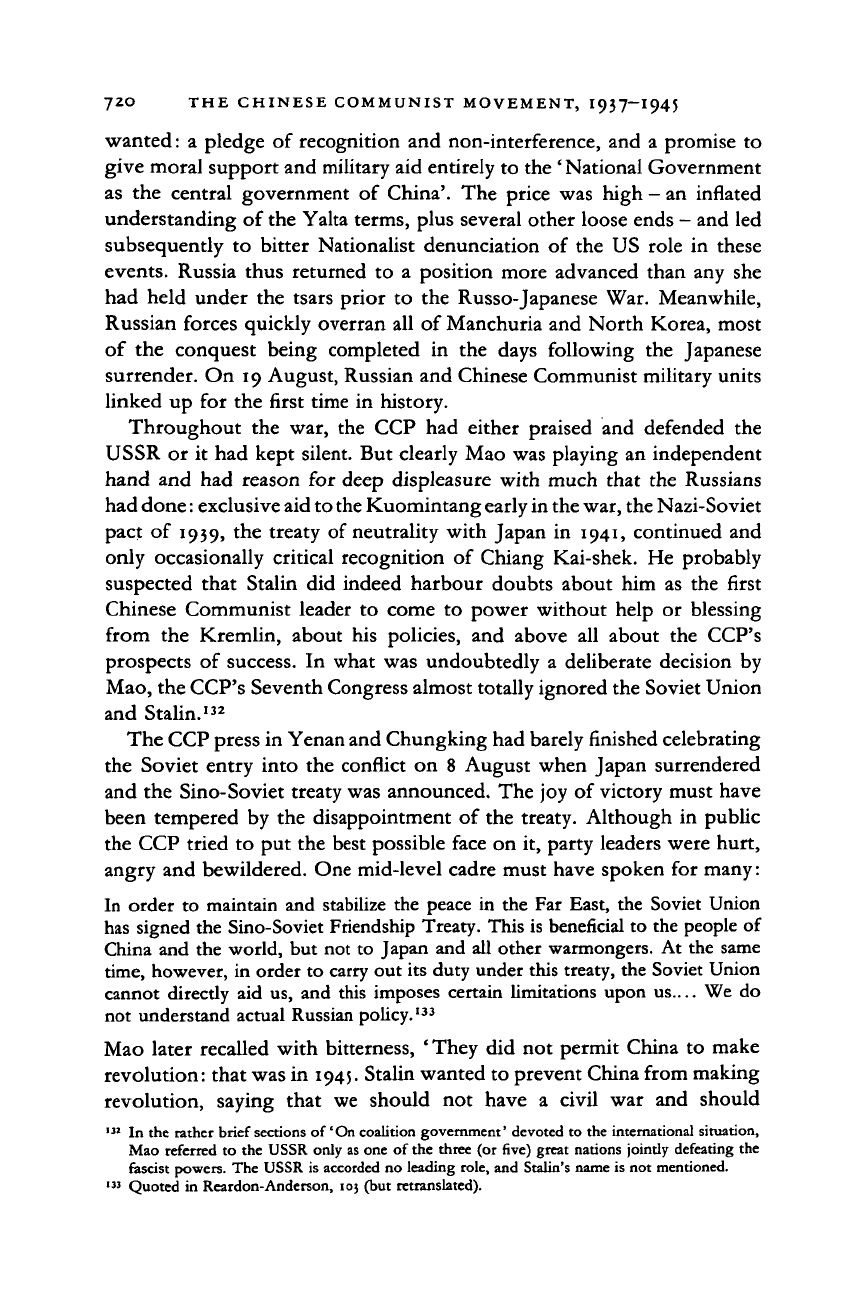
72O THE CHINESE COMMUNIST MOVEMENT, I937-I945
wanted:
a
pledge
of
recognition and non-interference, and
a
promise
to
give moral support and military aid entirely to the ' National Government
as the central government
of
China'. The price was high
—
an inflated
understanding of the Yalta terms, plus several other loose ends
-
and led
subsequently
to
bitter Nationalist denunciation
of
the US role
in
these
events. Russia thus returned
to a
position more advanced than any she
had held under the tsars prior
to
the Russo-Japanese War. Meanwhile,
Russian forces quickly overran all of Manchuria and North Korea, most
of the conquest being completed
in the
days following
the
Japanese
surrender. On 19 August, Russian and Chinese Communist military units
linked up for the first time in history.
Throughout the war, the CCP had either praised and defended
the
USSR or
it
had kept silent. But clearly Mao was playing an independent
hand and had reason for deep displeasure with much that the Russians
had
done:
exclusive aid to
the
Kuomintang early in the war, the Nazi-Soviet
pact
of
1939, the treaty of neutrality with Japan
in
1941, continued and
only occasionally critical recognition
of
Chiang Kai-shek. He probably
suspected that Stalin did indeed harbour doubts about him
as
the first
Chinese Communist leader
to
come
to
power without help
or
blessing
from
the
Kremlin, about his policies, and above
all
about the CCP's
prospects
of
success.
In
what was undoubtedly
a
deliberate decision by
Mao,
the CCP's Seventh Congress almost totally ignored the Soviet Union
and Stalin.
132
The CCP press in Yenan and Chungking had barely finished celebrating
the Soviet entry into the conflict
on
8 August when Japan surrendered
and the Sino-Soviet treaty was announced. The joy of victory must have
been tempered by the disappointment
of
the treaty. Although in public
the CCP tried to put the best possible face on it, party leaders were hurt,
angry and bewildered. One mid-level cadre must have spoken for many:
In order to maintain and stabilize the peace in the Far East, the Soviet Union
has signed the Sino-Soviet Friendship Treaty. This is beneficial to the people of
China and the world, but not to Japan and all other warmongers. At the same
time,
however, in order to carry out its duty under this treaty, the Soviet Union
cannot direcdy aid us, and this imposes certain limitations upon us We do
not understand actual Russian policy.
133
Mao later recalled with bitterness, 'They did not permit China to make
revolution: that was in 1945. Stalin wanted to prevent China from making
revolution, saying that
we
should
not
have
a
civil
war and
should
132
In the rather brief sections
of
On coalition government' devoted to the international situation,
Mao referred
to
the USSR only as one of the three (or five) great nations jointly defeating the
fascist powers. The USSR is accorded no leading role, and Stalin's name is not mentioned.
133
Quoted in Reardon-Anderson, 103 (but retranslated).
Cambridge Histories Online © Cambridge University Press, 2008
